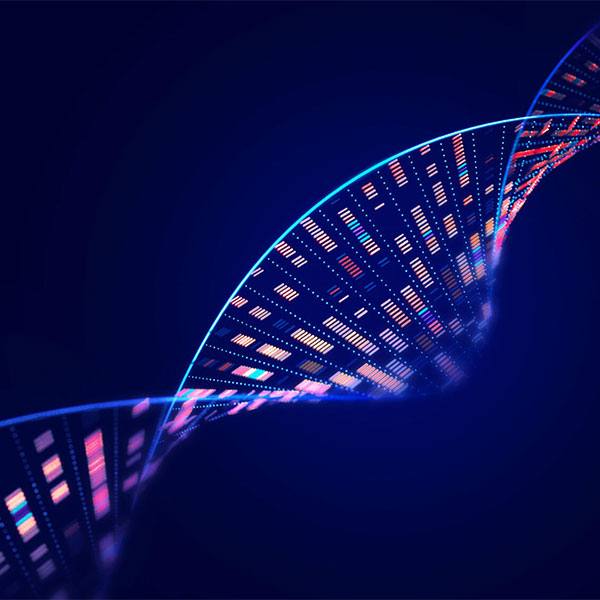-
Individualized Medicine
Why Thanksgiving is the perfect time to share family health history

As you gather around the table this Thanksgiving to share meals, stories and traditions, consider taking a moment to talk about something that could save lives: your family's health history.
Mayo Clinic experts are encouraging families to use the holiday to identify these risks and take proactive steps toward prevention.
"Hereditary conditions range from autoimmune disorders like celiac disease to cancers tied to genetic mutations," says Joseph Murray, M.D., a gastroenterologist at Mayo Clinic with over 30 years of expertise in treating complex digestive diseases. "Thanksgiving provides a unique opportunity to notice these patterns in your family's health and start conversations that could benefit generations to come."
Hereditary links to digestive conditions

Two conditions Dr. Murray highlights, celiac disease and eosinophilic esophagitis, can have hereditary components but are not always linked to family history.
"Food is central to Thanksgiving, so it's a perfect time to notice who's avoiding certain dishes," Dr. Murray says. "If someone skips bread or mentions swallowing difficulties, it could point to something hereditary."
Celiac disease, an autoimmune condition triggered by gluten, can cause symptoms like diarrhea, abdominal pain, bloating, weight loss, anemia, fatigue, skin rashes, mouth ulcers and joint pain. It can be diagnosed at any age and presents in over 300 ways, making testing crucial — especially for those with close relatives at higher risk.
"For siblings, the risk is as high as 20%," Dr. Murray says. "Accurate diagnosis is key, because eliminating gluten without testing can mask other health issues, such as irritable bowel syndrome or lactose intolerance, and delay treatment."
Dr. Murray says eosinophilic esophagitis is another condition to be aware of. It involves inflammation of the esophagus that leads to difficulty swallowing or food impaction. In children, symptoms can include vomiting, avoiding certain foods or difficulty gaining weight. In adults, it typically presents as difficulty swallowing or the sensation of food getting stuck, which can sometimes require emergency medical attention. Available treatment options include anti-inflammatory medications and immune-targeted therapies.
Turning genomics into action
Family health history also plays a vital role in cancer and heart disease prevention, says John Presutti, D.O., a family medicine physician and the Cecilia and Dan Carmichael Family Associate Director for the Center for Individualized Medicine at Mayo Clinic in Florida. In his dual role, Dr. Presutti combines his expertise in primary care with advances in genomics to help patients uncover hereditary risks and take proactive steps.

Dr. Presutti also leads Mayo Clinic's pilot program integrating genomic data into clinical care. This initiative offers genomic screening for actionable genetic markers associated with hereditary breast and ovarian cancer syndrome, Lynch syndrome and familial hypercholesterolemia. These markers can inform preemptive interventions and allow for personalized care.
"Approximately 10% of cancers are inherited," Dr. Presutti says. "Uncovering hidden genetic mutations through family discussions allows us to screen patients earlier and potentially save lives."
Hereditary breast and ovarian cancer syndrome is linked to mutations in the BRCA1 and BRCA2 genes. Mutations in BRCA1 can lead to a 60% lifetime risk of developing breast cancer and a 40% risk of having ovarian cancer, among other cancers. BRCA2 mutations increase the risk of developing breast cancer to 50% and ovarian cancer to 20%, with additional risks for prostate and pancreatic cancers in males.
Lynch syndrome is associated with an 80% lifetime risk of developing colorectal cancer and 50% risk of uterine/endometrial cancer. Familial hypercholesterolemia, a genetic disorder that causes dangerously high cholesterol levels, significantly increases the risk of early heart disease and stroke if left untreated.
Dr. Presutti encourages families to ask questions such as:
- Have any family members had cancer or heart disease?
- At what age were they diagnosed?
- Are there patterns of chronic illnesses or early deaths in the family?
Detecting early-onset GI cancers

For younger people, family health history can be especially important as rates of gastrointestinal (GI) cancers are on the rise among people under age 55. Mayo Clinic's Early Onset and Hereditary Gastrointestinal Cancers Program aims to address this growing concern, says Niloy Jewel Samadder, M.D., a Mayo Clinic gastroenterologist and cancer geneticist.
"The rise in young-onset gastrointestinal cancers is a pressing health issue," Dr. Samadder says. "Our goal is to put patients at the center of a collaborative framework of experts working seamlessly together."
Launched in 2024, the program integrates gastroenterology, oncology, surgery, pathology and genetics to provide comprehensive, patient-centered care. Translational discoveries, such as immunology studies and a multi-omics approach, are also part of the program, helping to tailor treatments to a patient's unique biological profile.
"This multidisciplinary approach doesn't just address cancer — it uncovers hereditary risks that can guide care for families," Dr. Samadder explains. "It's about creating a roadmap for prevention and better outcomes."
A tradition that saves lives
If you discover something significant about your family health history this Thanksgiving, take action:
- Talk to your primary care provider about screening or preventive measures.
- Encourage family members to discuss shared health risks with their doctors.
- Learn about lifestyle changes or early interventions that could lower your risk.
- Stay proactive by keeping your health records updated and sharing them with relatives.
"Don't just talk about your family health history," Dr. Presutti says. "Act on it. It could save your life."
Related Articles







